Quantitative Research Project: Nutrition, Mental Health, and COVID-19
VerifiedAdded on 2022/07/28
|11
|2820
|29
Project
AI Summary
This document outlines a comprehensive quantitative research project investigating the connection between nutrition and mental health, particularly focusing on dietary risk factors, dietary intake, and the potential benefits of nootropics for depressed adult Canadians during the COVID-19 pandemic. The study proposes a randomized controlled trial (RCT) involving 300 participants, utilizing questionnaires based on a five-point Likert scale to collect data on dietary patterns, risk factors, and mental health outcomes. The research aims to address two key questions: the relationship between dietary risk factors and dietary intake, and the relationship between nootropic use and mental health outcomes. Bivariate statistical tests, including ANOVA and Chi-Square tests, will be employed to analyze the collected data. The study also addresses ethical considerations, including informed consent and potential biases, as well as measures to ensure research validity and reliability. The anticipated findings suggest significant implications for practice, emphasizing the importance of understanding dietary factors in managing depression and potentially improving cognitive performance through nootropics. A detailed dissemination plan is included to share the research findings through publications and presentations. The study anticipates that understanding dietary risk factors associated with depression can help people avoid triggers, as well as comprehensive knowledge of dietary intake patterns and how it relates to risk factors could enhance the prevention of depression.
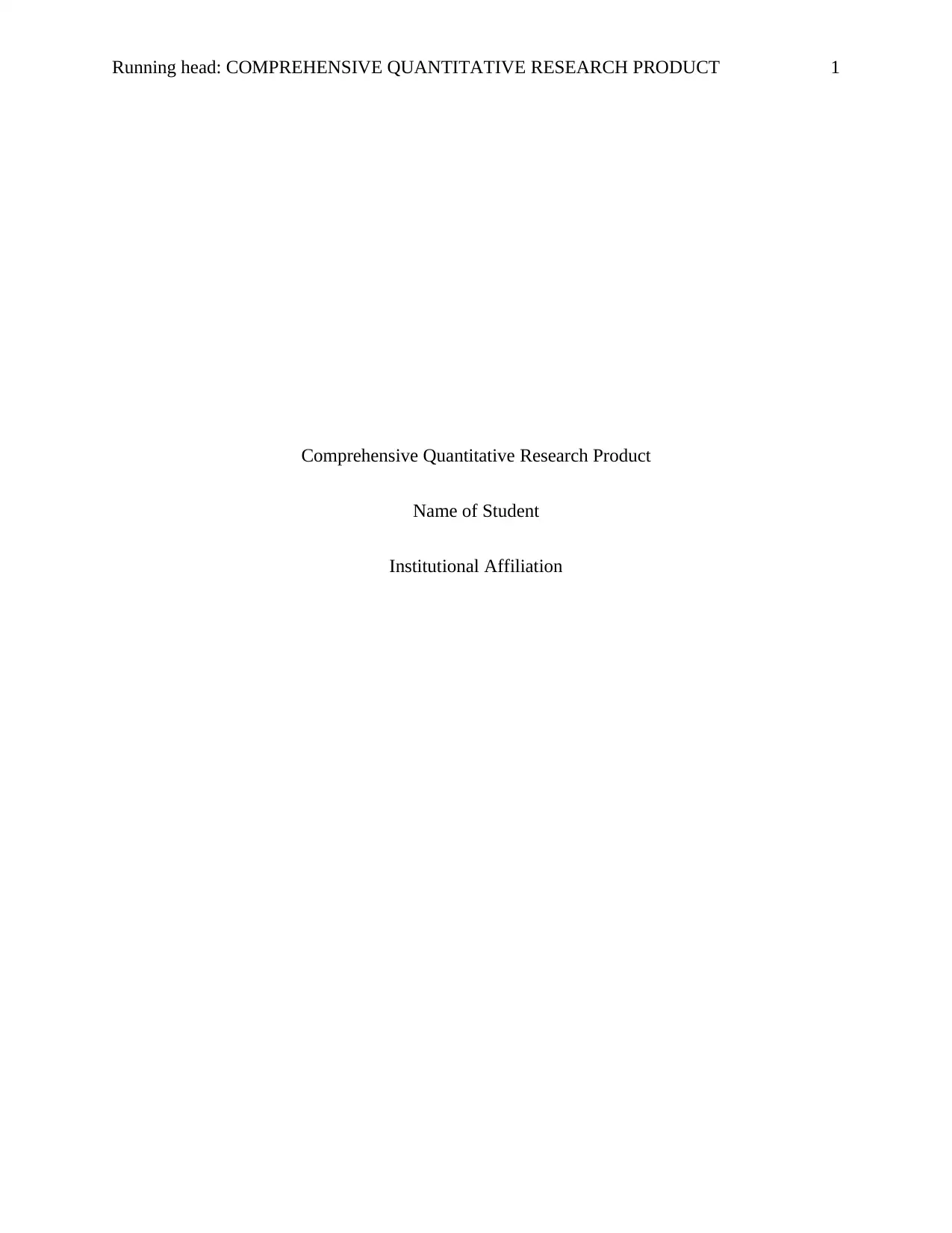
Running head: COMPREHENSIVE QUANTITATIVE RESEARCH PRODUCT 1
Comprehensive Quantitative Research Product
Name of Student
Institutional Affiliation
Comprehensive Quantitative Research Product
Name of Student
Institutional Affiliation
Paraphrase This Document
Need a fresh take? Get an instant paraphrase of this document with our AI Paraphraser
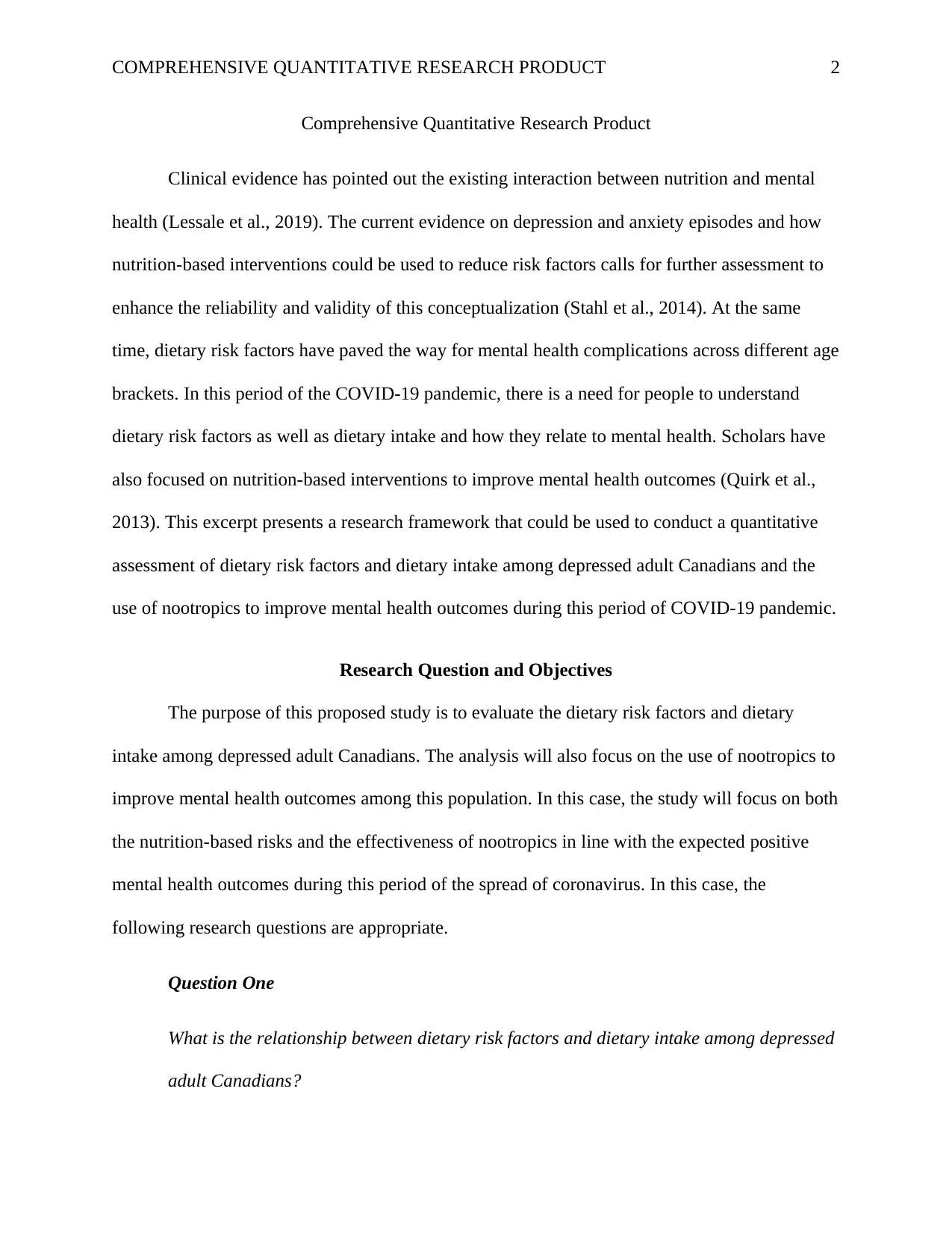
COMPREHENSIVE QUANTITATIVE RESEARCH PRODUCT 2
Comprehensive Quantitative Research Product
Clinical evidence has pointed out the existing interaction between nutrition and mental
health (Lessale et al., 2019). The current evidence on depression and anxiety episodes and how
nutrition-based interventions could be used to reduce risk factors calls for further assessment to
enhance the reliability and validity of this conceptualization (Stahl et al., 2014). At the same
time, dietary risk factors have paved the way for mental health complications across different age
brackets. In this period of the COVID-19 pandemic, there is a need for people to understand
dietary risk factors as well as dietary intake and how they relate to mental health. Scholars have
also focused on nutrition-based interventions to improve mental health outcomes (Quirk et al.,
2013). This excerpt presents a research framework that could be used to conduct a quantitative
assessment of dietary risk factors and dietary intake among depressed adult Canadians and the
use of nootropics to improve mental health outcomes during this period of COVID-19 pandemic.
Research Question and Objectives
The purpose of this proposed study is to evaluate the dietary risk factors and dietary
intake among depressed adult Canadians. The analysis will also focus on the use of nootropics to
improve mental health outcomes among this population. In this case, the study will focus on both
the nutrition-based risks and the effectiveness of nootropics in line with the expected positive
mental health outcomes during this period of the spread of coronavirus. In this case, the
following research questions are appropriate.
Question One
What is the relationship between dietary risk factors and dietary intake among depressed
adult Canadians?
Comprehensive Quantitative Research Product
Clinical evidence has pointed out the existing interaction between nutrition and mental
health (Lessale et al., 2019). The current evidence on depression and anxiety episodes and how
nutrition-based interventions could be used to reduce risk factors calls for further assessment to
enhance the reliability and validity of this conceptualization (Stahl et al., 2014). At the same
time, dietary risk factors have paved the way for mental health complications across different age
brackets. In this period of the COVID-19 pandemic, there is a need for people to understand
dietary risk factors as well as dietary intake and how they relate to mental health. Scholars have
also focused on nutrition-based interventions to improve mental health outcomes (Quirk et al.,
2013). This excerpt presents a research framework that could be used to conduct a quantitative
assessment of dietary risk factors and dietary intake among depressed adult Canadians and the
use of nootropics to improve mental health outcomes during this period of COVID-19 pandemic.
Research Question and Objectives
The purpose of this proposed study is to evaluate the dietary risk factors and dietary
intake among depressed adult Canadians. The analysis will also focus on the use of nootropics to
improve mental health outcomes among this population. In this case, the study will focus on both
the nutrition-based risks and the effectiveness of nootropics in line with the expected positive
mental health outcomes during this period of the spread of coronavirus. In this case, the
following research questions are appropriate.
Question One
What is the relationship between dietary risk factors and dietary intake among depressed
adult Canadians?
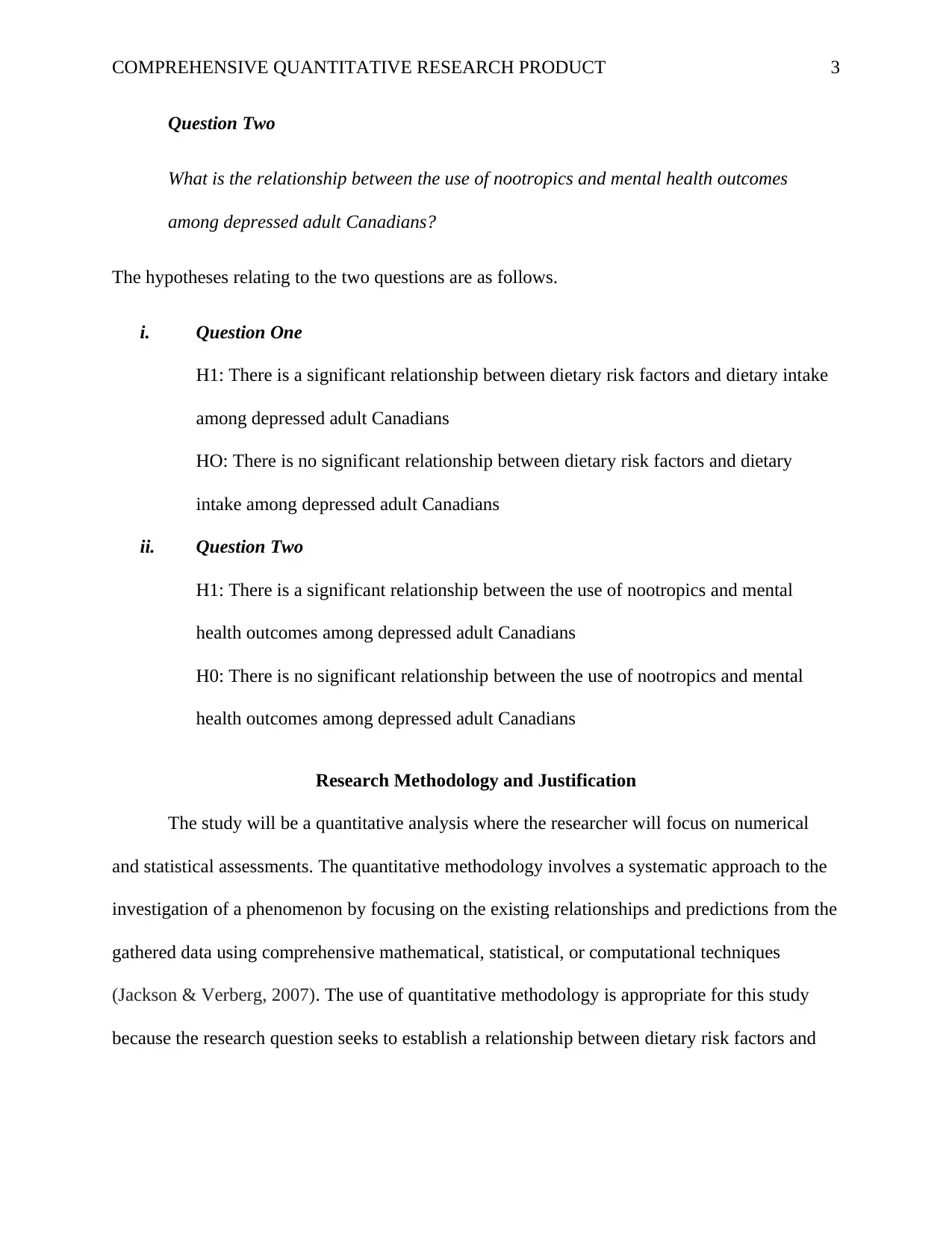
COMPREHENSIVE QUANTITATIVE RESEARCH PRODUCT 3
Question Two
What is the relationship between the use of nootropics and mental health outcomes
among depressed adult Canadians?
The hypotheses relating to the two questions are as follows.
i. Question One
H1: There is a significant relationship between dietary risk factors and dietary intake
among depressed adult Canadians
HO: There is no significant relationship between dietary risk factors and dietary
intake among depressed adult Canadians
ii. Question Two
H1: There is a significant relationship between the use of nootropics and mental
health outcomes among depressed adult Canadians
H0: There is no significant relationship between the use of nootropics and mental
health outcomes among depressed adult Canadians
Research Methodology and Justification
The study will be a quantitative analysis where the researcher will focus on numerical
and statistical assessments. The quantitative methodology involves a systematic approach to the
investigation of a phenomenon by focusing on the existing relationships and predictions from the
gathered data using comprehensive mathematical, statistical, or computational techniques
(Jackson & Verberg, 2007). The use of quantitative methodology is appropriate for this study
because the research question seeks to establish a relationship between dietary risk factors and
Question Two
What is the relationship between the use of nootropics and mental health outcomes
among depressed adult Canadians?
The hypotheses relating to the two questions are as follows.
i. Question One
H1: There is a significant relationship between dietary risk factors and dietary intake
among depressed adult Canadians
HO: There is no significant relationship between dietary risk factors and dietary
intake among depressed adult Canadians
ii. Question Two
H1: There is a significant relationship between the use of nootropics and mental
health outcomes among depressed adult Canadians
H0: There is no significant relationship between the use of nootropics and mental
health outcomes among depressed adult Canadians
Research Methodology and Justification
The study will be a quantitative analysis where the researcher will focus on numerical
and statistical assessments. The quantitative methodology involves a systematic approach to the
investigation of a phenomenon by focusing on the existing relationships and predictions from the
gathered data using comprehensive mathematical, statistical, or computational techniques
(Jackson & Verberg, 2007). The use of quantitative methodology is appropriate for this study
because the research question seeks to establish a relationship between dietary risk factors and
⊘ This is a preview!⊘
Do you want full access?
Subscribe today to unlock all pages.

Trusted by 1+ million students worldwide
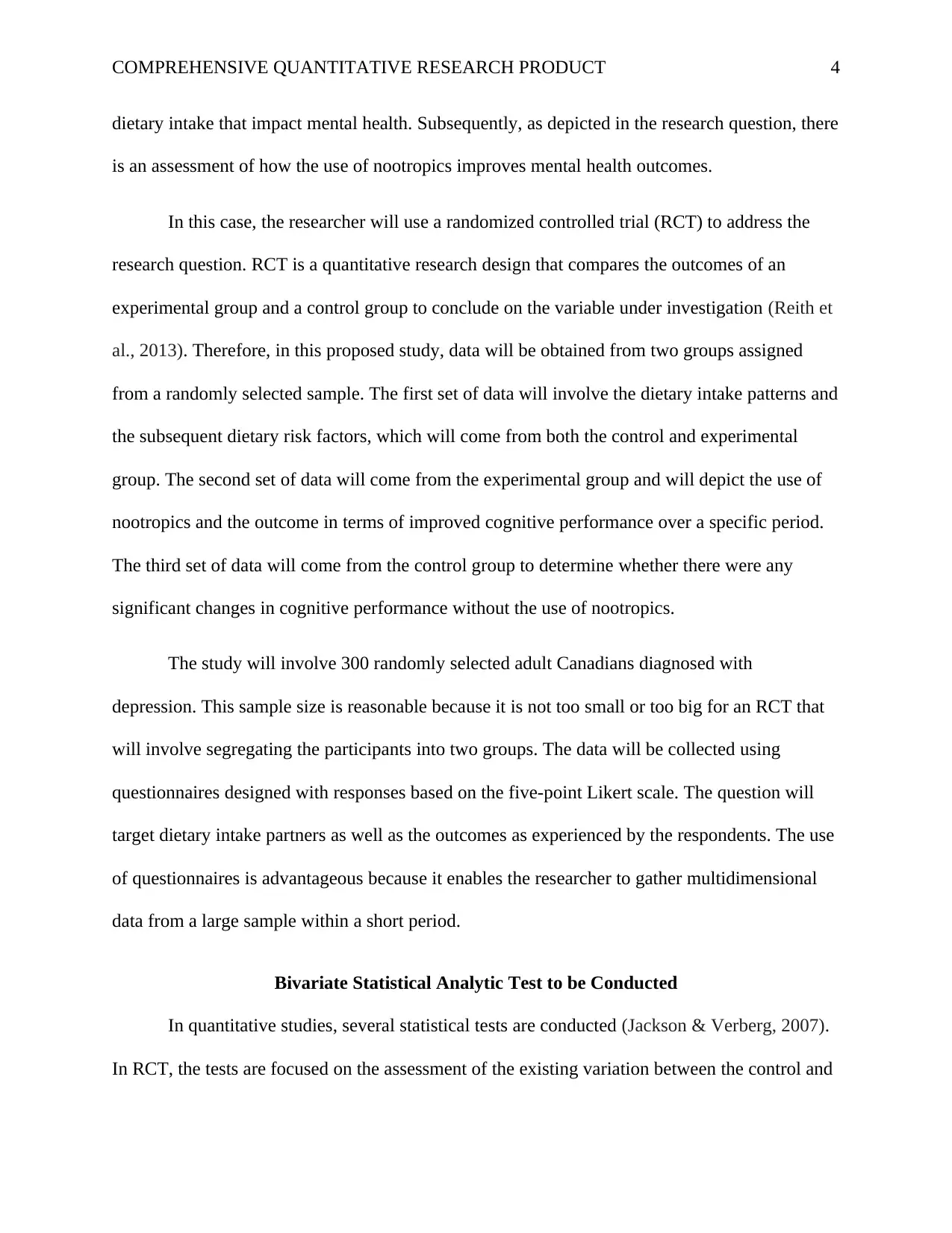
COMPREHENSIVE QUANTITATIVE RESEARCH PRODUCT 4
dietary intake that impact mental health. Subsequently, as depicted in the research question, there
is an assessment of how the use of nootropics improves mental health outcomes.
In this case, the researcher will use a randomized controlled trial (RCT) to address the
research question. RCT is a quantitative research design that compares the outcomes of an
experimental group and a control group to conclude on the variable under investigation (Reith et
al., 2013). Therefore, in this proposed study, data will be obtained from two groups assigned
from a randomly selected sample. The first set of data will involve the dietary intake patterns and
the subsequent dietary risk factors, which will come from both the control and experimental
group. The second set of data will come from the experimental group and will depict the use of
nootropics and the outcome in terms of improved cognitive performance over a specific period.
The third set of data will come from the control group to determine whether there were any
significant changes in cognitive performance without the use of nootropics.
The study will involve 300 randomly selected adult Canadians diagnosed with
depression. This sample size is reasonable because it is not too small or too big for an RCT that
will involve segregating the participants into two groups. The data will be collected using
questionnaires designed with responses based on the five-point Likert scale. The question will
target dietary intake partners as well as the outcomes as experienced by the respondents. The use
of questionnaires is advantageous because it enables the researcher to gather multidimensional
data from a large sample within a short period.
Bivariate Statistical Analytic Test to be Conducted
In quantitative studies, several statistical tests are conducted (Jackson & Verberg, 2007).
In RCT, the tests are focused on the assessment of the existing variation between the control and
dietary intake that impact mental health. Subsequently, as depicted in the research question, there
is an assessment of how the use of nootropics improves mental health outcomes.
In this case, the researcher will use a randomized controlled trial (RCT) to address the
research question. RCT is a quantitative research design that compares the outcomes of an
experimental group and a control group to conclude on the variable under investigation (Reith et
al., 2013). Therefore, in this proposed study, data will be obtained from two groups assigned
from a randomly selected sample. The first set of data will involve the dietary intake patterns and
the subsequent dietary risk factors, which will come from both the control and experimental
group. The second set of data will come from the experimental group and will depict the use of
nootropics and the outcome in terms of improved cognitive performance over a specific period.
The third set of data will come from the control group to determine whether there were any
significant changes in cognitive performance without the use of nootropics.
The study will involve 300 randomly selected adult Canadians diagnosed with
depression. This sample size is reasonable because it is not too small or too big for an RCT that
will involve segregating the participants into two groups. The data will be collected using
questionnaires designed with responses based on the five-point Likert scale. The question will
target dietary intake partners as well as the outcomes as experienced by the respondents. The use
of questionnaires is advantageous because it enables the researcher to gather multidimensional
data from a large sample within a short period.
Bivariate Statistical Analytic Test to be Conducted
In quantitative studies, several statistical tests are conducted (Jackson & Verberg, 2007).
In RCT, the tests are focused on the assessment of the existing variation between the control and
Paraphrase This Document
Need a fresh take? Get an instant paraphrase of this document with our AI Paraphraser
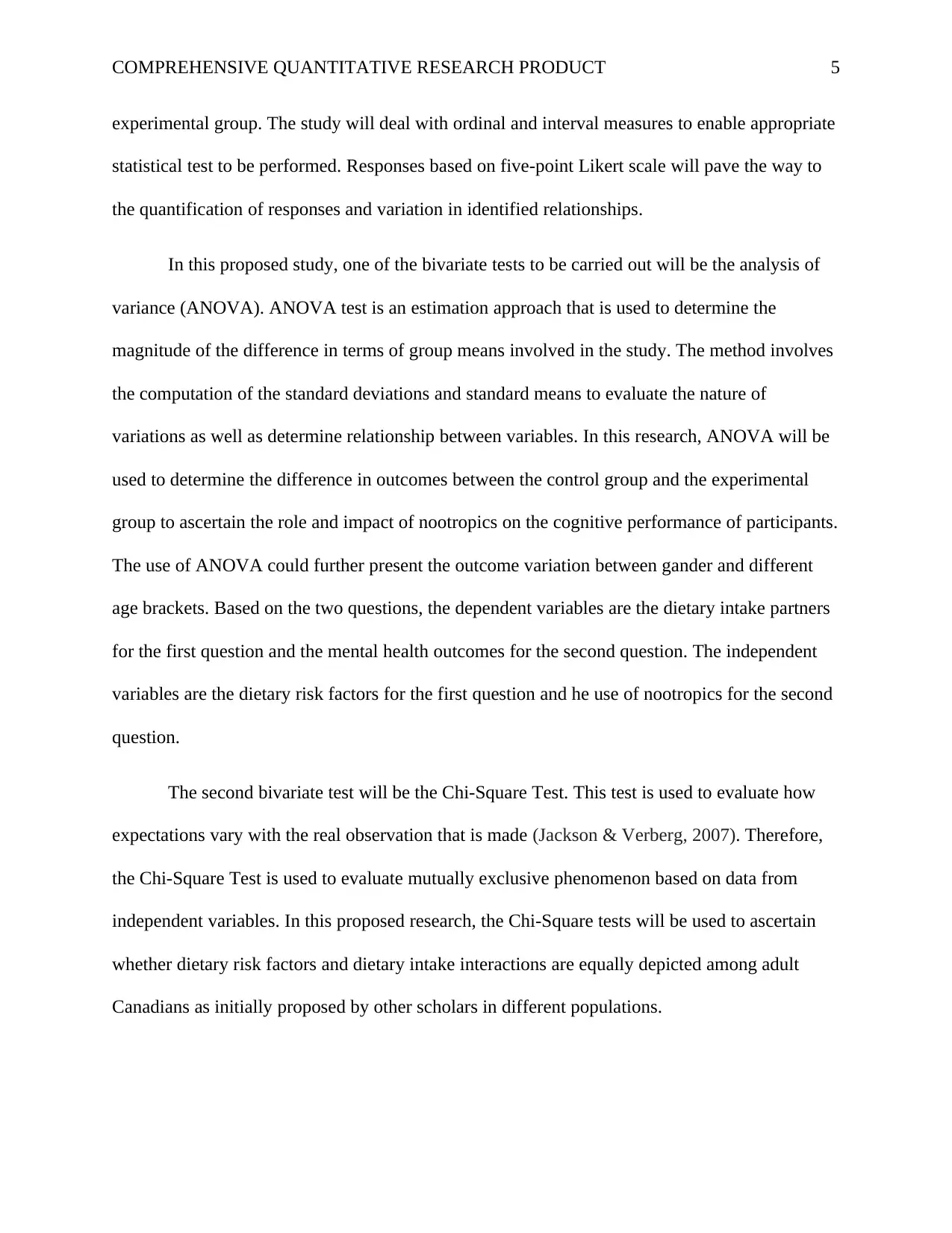
COMPREHENSIVE QUANTITATIVE RESEARCH PRODUCT 5
experimental group. The study will deal with ordinal and interval measures to enable appropriate
statistical test to be performed. Responses based on five-point Likert scale will pave the way to
the quantification of responses and variation in identified relationships.
In this proposed study, one of the bivariate tests to be carried out will be the analysis of
variance (ANOVA). ANOVA test is an estimation approach that is used to determine the
magnitude of the difference in terms of group means involved in the study. The method involves
the computation of the standard deviations and standard means to evaluate the nature of
variations as well as determine relationship between variables. In this research, ANOVA will be
used to determine the difference in outcomes between the control group and the experimental
group to ascertain the role and impact of nootropics on the cognitive performance of participants.
The use of ANOVA could further present the outcome variation between gander and different
age brackets. Based on the two questions, the dependent variables are the dietary intake partners
for the first question and the mental health outcomes for the second question. The independent
variables are the dietary risk factors for the first question and he use of nootropics for the second
question.
The second bivariate test will be the Chi-Square Test. This test is used to evaluate how
expectations vary with the real observation that is made (Jackson & Verberg, 2007). Therefore,
the Chi-Square Test is used to evaluate mutually exclusive phenomenon based on data from
independent variables. In this proposed research, the Chi-Square tests will be used to ascertain
whether dietary risk factors and dietary intake interactions are equally depicted among adult
Canadians as initially proposed by other scholars in different populations.
experimental group. The study will deal with ordinal and interval measures to enable appropriate
statistical test to be performed. Responses based on five-point Likert scale will pave the way to
the quantification of responses and variation in identified relationships.
In this proposed study, one of the bivariate tests to be carried out will be the analysis of
variance (ANOVA). ANOVA test is an estimation approach that is used to determine the
magnitude of the difference in terms of group means involved in the study. The method involves
the computation of the standard deviations and standard means to evaluate the nature of
variations as well as determine relationship between variables. In this research, ANOVA will be
used to determine the difference in outcomes between the control group and the experimental
group to ascertain the role and impact of nootropics on the cognitive performance of participants.
The use of ANOVA could further present the outcome variation between gander and different
age brackets. Based on the two questions, the dependent variables are the dietary intake partners
for the first question and the mental health outcomes for the second question. The independent
variables are the dietary risk factors for the first question and he use of nootropics for the second
question.
The second bivariate test will be the Chi-Square Test. This test is used to evaluate how
expectations vary with the real observation that is made (Jackson & Verberg, 2007). Therefore,
the Chi-Square Test is used to evaluate mutually exclusive phenomenon based on data from
independent variables. In this proposed research, the Chi-Square tests will be used to ascertain
whether dietary risk factors and dietary intake interactions are equally depicted among adult
Canadians as initially proposed by other scholars in different populations.
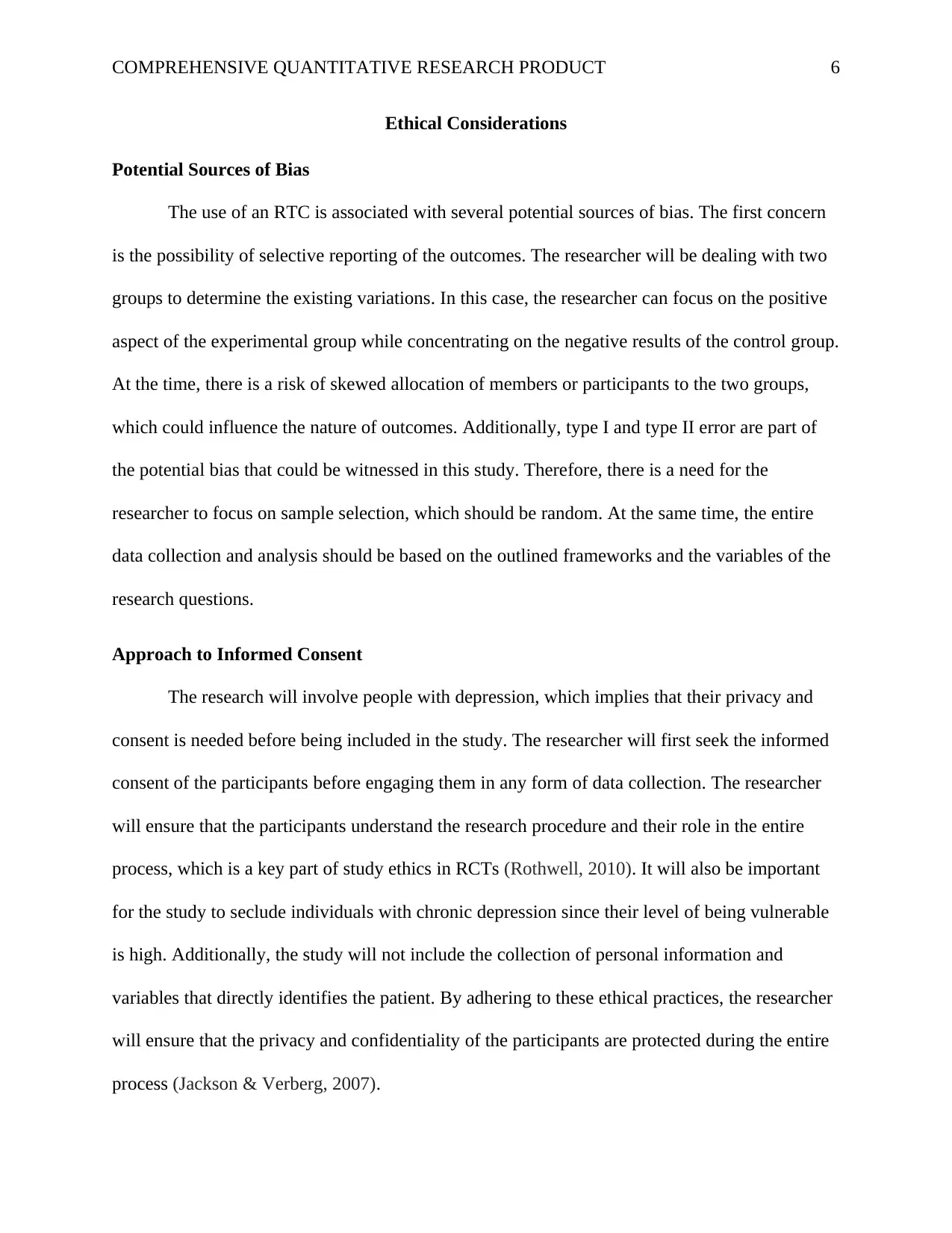
COMPREHENSIVE QUANTITATIVE RESEARCH PRODUCT 6
Ethical Considerations
Potential Sources of Bias
The use of an RTC is associated with several potential sources of bias. The first concern
is the possibility of selective reporting of the outcomes. The researcher will be dealing with two
groups to determine the existing variations. In this case, the researcher can focus on the positive
aspect of the experimental group while concentrating on the negative results of the control group.
At the time, there is a risk of skewed allocation of members or participants to the two groups,
which could influence the nature of outcomes. Additionally, type I and type II error are part of
the potential bias that could be witnessed in this study. Therefore, there is a need for the
researcher to focus on sample selection, which should be random. At the same time, the entire
data collection and analysis should be based on the outlined frameworks and the variables of the
research questions.
Approach to Informed Consent
The research will involve people with depression, which implies that their privacy and
consent is needed before being included in the study. The researcher will first seek the informed
consent of the participants before engaging them in any form of data collection. The researcher
will ensure that the participants understand the research procedure and their role in the entire
process, which is a key part of study ethics in RCTs (Rothwell, 2010). It will also be important
for the study to seclude individuals with chronic depression since their level of being vulnerable
is high. Additionally, the study will not include the collection of personal information and
variables that directly identifies the patient. By adhering to these ethical practices, the researcher
will ensure that the privacy and confidentiality of the participants are protected during the entire
process (Jackson & Verberg, 2007).
Ethical Considerations
Potential Sources of Bias
The use of an RTC is associated with several potential sources of bias. The first concern
is the possibility of selective reporting of the outcomes. The researcher will be dealing with two
groups to determine the existing variations. In this case, the researcher can focus on the positive
aspect of the experimental group while concentrating on the negative results of the control group.
At the time, there is a risk of skewed allocation of members or participants to the two groups,
which could influence the nature of outcomes. Additionally, type I and type II error are part of
the potential bias that could be witnessed in this study. Therefore, there is a need for the
researcher to focus on sample selection, which should be random. At the same time, the entire
data collection and analysis should be based on the outlined frameworks and the variables of the
research questions.
Approach to Informed Consent
The research will involve people with depression, which implies that their privacy and
consent is needed before being included in the study. The researcher will first seek the informed
consent of the participants before engaging them in any form of data collection. The researcher
will ensure that the participants understand the research procedure and their role in the entire
process, which is a key part of study ethics in RCTs (Rothwell, 2010). It will also be important
for the study to seclude individuals with chronic depression since their level of being vulnerable
is high. Additionally, the study will not include the collection of personal information and
variables that directly identifies the patient. By adhering to these ethical practices, the researcher
will ensure that the privacy and confidentiality of the participants are protected during the entire
process (Jackson & Verberg, 2007).
⊘ This is a preview!⊘
Do you want full access?
Subscribe today to unlock all pages.

Trusted by 1+ million students worldwide
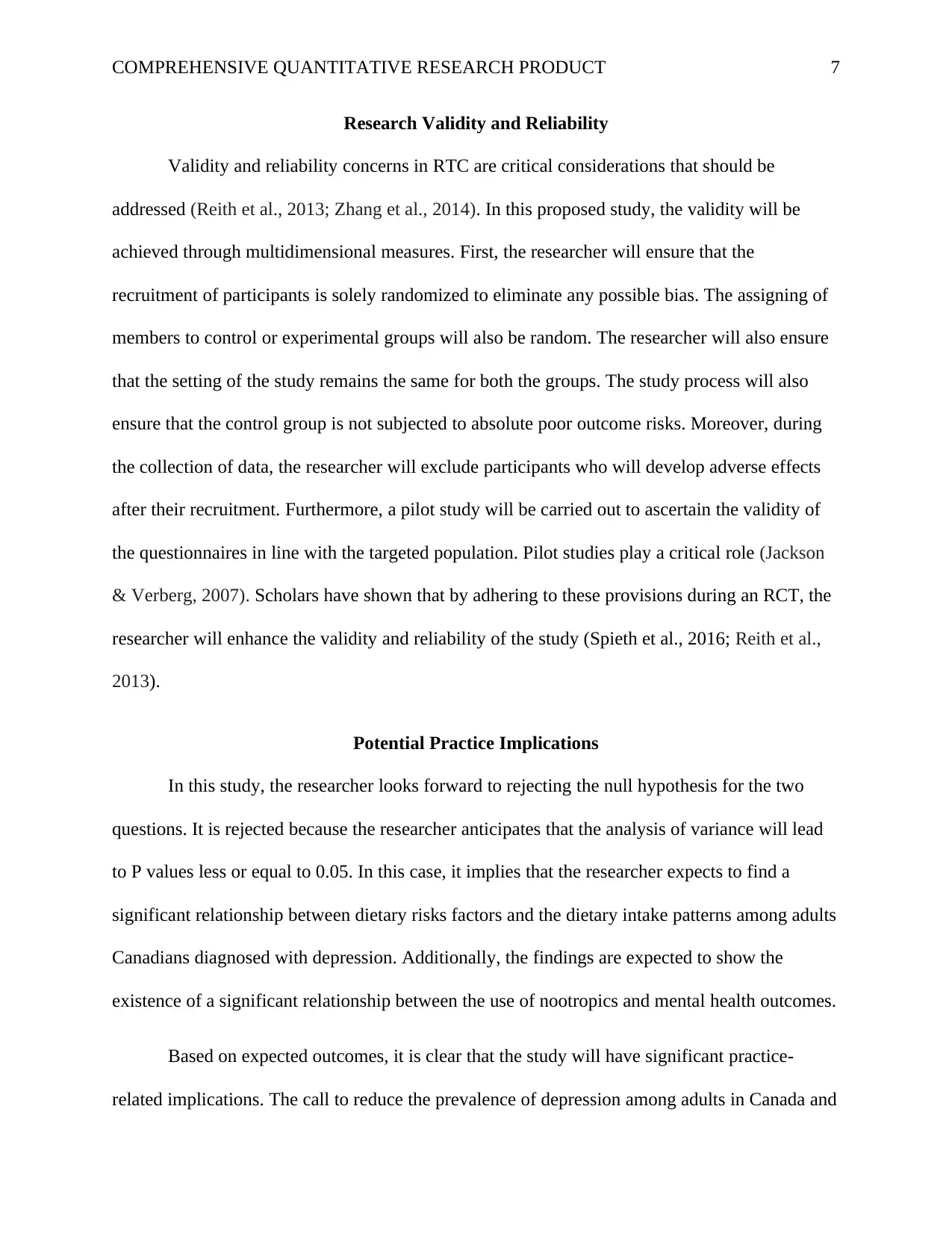
COMPREHENSIVE QUANTITATIVE RESEARCH PRODUCT 7
Research Validity and Reliability
Validity and reliability concerns in RTC are critical considerations that should be
addressed (Reith et al., 2013; Zhang et al., 2014). In this proposed study, the validity will be
achieved through multidimensional measures. First, the researcher will ensure that the
recruitment of participants is solely randomized to eliminate any possible bias. The assigning of
members to control or experimental groups will also be random. The researcher will also ensure
that the setting of the study remains the same for both the groups. The study process will also
ensure that the control group is not subjected to absolute poor outcome risks. Moreover, during
the collection of data, the researcher will exclude participants who will develop adverse effects
after their recruitment. Furthermore, a pilot study will be carried out to ascertain the validity of
the questionnaires in line with the targeted population. Pilot studies play a critical role (Jackson
& Verberg, 2007). Scholars have shown that by adhering to these provisions during an RCT, the
researcher will enhance the validity and reliability of the study (Spieth et al., 2016; Reith et al.,
2013).
Potential Practice Implications
In this study, the researcher looks forward to rejecting the null hypothesis for the two
questions. It is rejected because the researcher anticipates that the analysis of variance will lead
to P values less or equal to 0.05. In this case, it implies that the researcher expects to find a
significant relationship between dietary risks factors and the dietary intake patterns among adults
Canadians diagnosed with depression. Additionally, the findings are expected to show the
existence of a significant relationship between the use of nootropics and mental health outcomes.
Based on expected outcomes, it is clear that the study will have significant practice-
related implications. The call to reduce the prevalence of depression among adults in Canada and
Research Validity and Reliability
Validity and reliability concerns in RTC are critical considerations that should be
addressed (Reith et al., 2013; Zhang et al., 2014). In this proposed study, the validity will be
achieved through multidimensional measures. First, the researcher will ensure that the
recruitment of participants is solely randomized to eliminate any possible bias. The assigning of
members to control or experimental groups will also be random. The researcher will also ensure
that the setting of the study remains the same for both the groups. The study process will also
ensure that the control group is not subjected to absolute poor outcome risks. Moreover, during
the collection of data, the researcher will exclude participants who will develop adverse effects
after their recruitment. Furthermore, a pilot study will be carried out to ascertain the validity of
the questionnaires in line with the targeted population. Pilot studies play a critical role (Jackson
& Verberg, 2007). Scholars have shown that by adhering to these provisions during an RCT, the
researcher will enhance the validity and reliability of the study (Spieth et al., 2016; Reith et al.,
2013).
Potential Practice Implications
In this study, the researcher looks forward to rejecting the null hypothesis for the two
questions. It is rejected because the researcher anticipates that the analysis of variance will lead
to P values less or equal to 0.05. In this case, it implies that the researcher expects to find a
significant relationship between dietary risks factors and the dietary intake patterns among adults
Canadians diagnosed with depression. Additionally, the findings are expected to show the
existence of a significant relationship between the use of nootropics and mental health outcomes.
Based on expected outcomes, it is clear that the study will have significant practice-
related implications. The call to reduce the prevalence of depression among adults in Canada and
Paraphrase This Document
Need a fresh take? Get an instant paraphrase of this document with our AI Paraphraser
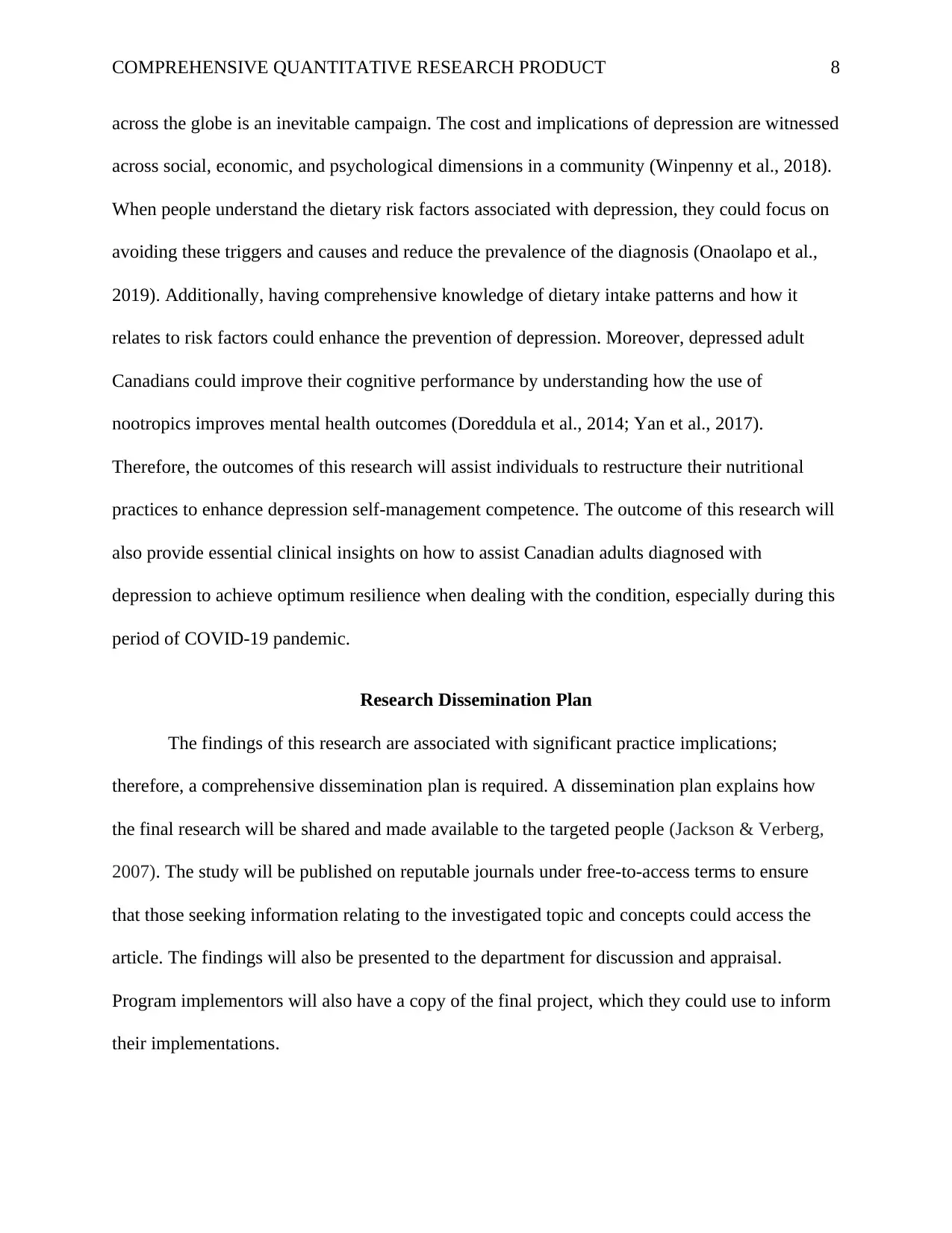
COMPREHENSIVE QUANTITATIVE RESEARCH PRODUCT 8
across the globe is an inevitable campaign. The cost and implications of depression are witnessed
across social, economic, and psychological dimensions in a community (Winpenny et al., 2018).
When people understand the dietary risk factors associated with depression, they could focus on
avoiding these triggers and causes and reduce the prevalence of the diagnosis (Onaolapo et al.,
2019). Additionally, having comprehensive knowledge of dietary intake patterns and how it
relates to risk factors could enhance the prevention of depression. Moreover, depressed adult
Canadians could improve their cognitive performance by understanding how the use of
nootropics improves mental health outcomes (Doreddula et al., 2014; Yan et al., 2017).
Therefore, the outcomes of this research will assist individuals to restructure their nutritional
practices to enhance depression self-management competence. The outcome of this research will
also provide essential clinical insights on how to assist Canadian adults diagnosed with
depression to achieve optimum resilience when dealing with the condition, especially during this
period of COVID-19 pandemic.
Research Dissemination Plan
The findings of this research are associated with significant practice implications;
therefore, a comprehensive dissemination plan is required. A dissemination plan explains how
the final research will be shared and made available to the targeted people (Jackson & Verberg,
2007). The study will be published on reputable journals under free-to-access terms to ensure
that those seeking information relating to the investigated topic and concepts could access the
article. The findings will also be presented to the department for discussion and appraisal.
Program implementors will also have a copy of the final project, which they could use to inform
their implementations.
across the globe is an inevitable campaign. The cost and implications of depression are witnessed
across social, economic, and psychological dimensions in a community (Winpenny et al., 2018).
When people understand the dietary risk factors associated with depression, they could focus on
avoiding these triggers and causes and reduce the prevalence of the diagnosis (Onaolapo et al.,
2019). Additionally, having comprehensive knowledge of dietary intake patterns and how it
relates to risk factors could enhance the prevention of depression. Moreover, depressed adult
Canadians could improve their cognitive performance by understanding how the use of
nootropics improves mental health outcomes (Doreddula et al., 2014; Yan et al., 2017).
Therefore, the outcomes of this research will assist individuals to restructure their nutritional
practices to enhance depression self-management competence. The outcome of this research will
also provide essential clinical insights on how to assist Canadian adults diagnosed with
depression to achieve optimum resilience when dealing with the condition, especially during this
period of COVID-19 pandemic.
Research Dissemination Plan
The findings of this research are associated with significant practice implications;
therefore, a comprehensive dissemination plan is required. A dissemination plan explains how
the final research will be shared and made available to the targeted people (Jackson & Verberg,
2007). The study will be published on reputable journals under free-to-access terms to ensure
that those seeking information relating to the investigated topic and concepts could access the
article. The findings will also be presented to the department for discussion and appraisal.
Program implementors will also have a copy of the final project, which they could use to inform
their implementations.
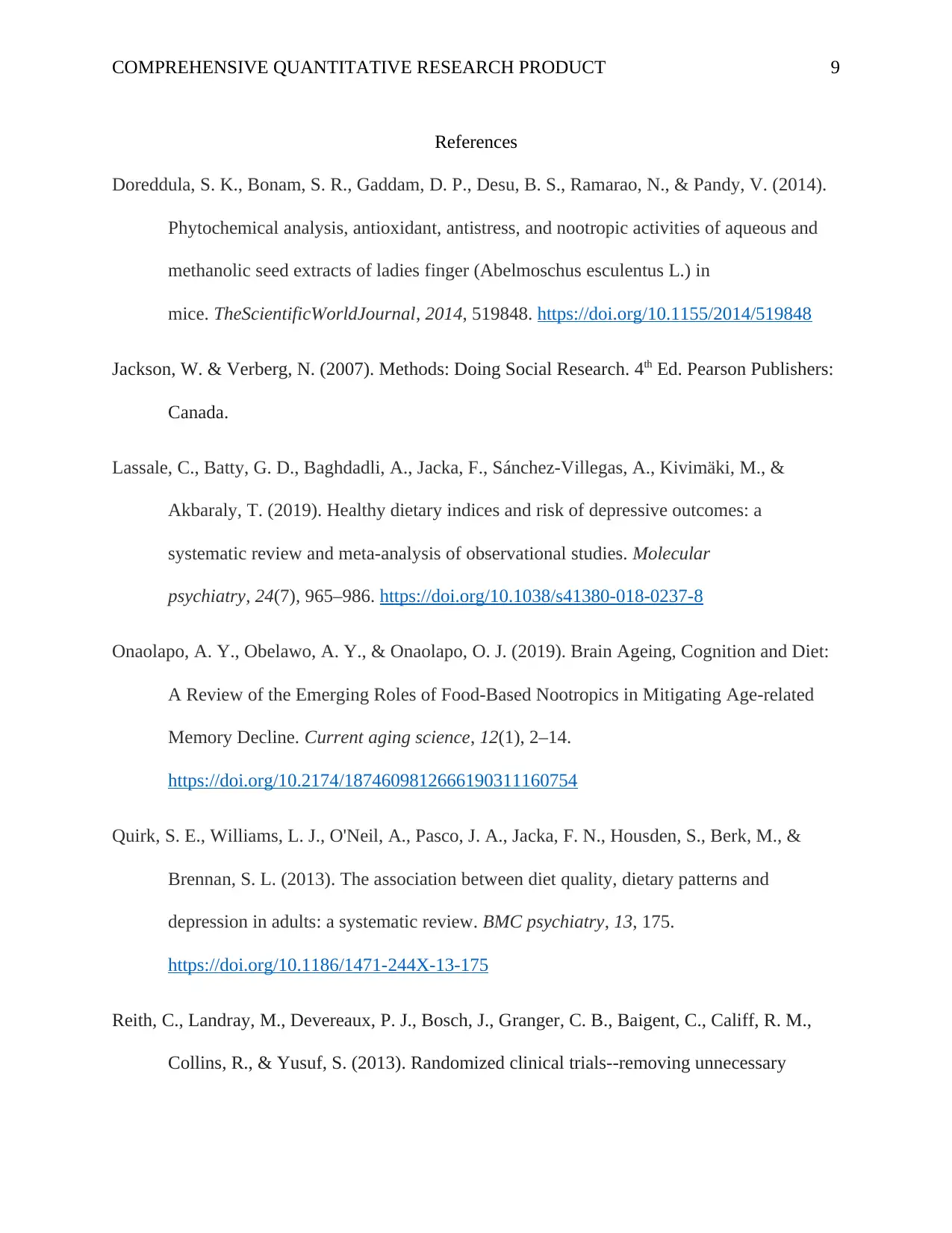
COMPREHENSIVE QUANTITATIVE RESEARCH PRODUCT 9
References
Doreddula, S. K., Bonam, S. R., Gaddam, D. P., Desu, B. S., Ramarao, N., & Pandy, V. (2014).
Phytochemical analysis, antioxidant, antistress, and nootropic activities of aqueous and
methanolic seed extracts of ladies finger (Abelmoschus esculentus L.) in
mice. TheScientificWorldJournal, 2014, 519848. https://doi.org/10.1155/2014/519848
Jackson, W. & Verberg, N. (2007). Methods: Doing Social Research. 4th Ed. Pearson Publishers:
Canada.
Lassale, C., Batty, G. D., Baghdadli, A., Jacka, F., Sánchez-Villegas, A., Kivimäki, M., &
Akbaraly, T. (2019). Healthy dietary indices and risk of depressive outcomes: a
systematic review and meta-analysis of observational studies. Molecular
psychiatry, 24(7), 965–986. https://doi.org/10.1038/s41380-018-0237-8
Onaolapo, A. Y., Obelawo, A. Y., & Onaolapo, O. J. (2019). Brain Ageing, Cognition and Diet:
A Review of the Emerging Roles of Food-Based Nootropics in Mitigating Age-related
Memory Decline. Current aging science, 12(1), 2–14.
https://doi.org/10.2174/1874609812666190311160754
Quirk, S. E., Williams, L. J., O'Neil, A., Pasco, J. A., Jacka, F. N., Housden, S., Berk, M., &
Brennan, S. L. (2013). The association between diet quality, dietary patterns and
depression in adults: a systematic review. BMC psychiatry, 13, 175.
https://doi.org/10.1186/1471-244X-13-175
Reith, C., Landray, M., Devereaux, P. J., Bosch, J., Granger, C. B., Baigent, C., Califf, R. M.,
Collins, R., & Yusuf, S. (2013). Randomized clinical trials--removing unnecessary
References
Doreddula, S. K., Bonam, S. R., Gaddam, D. P., Desu, B. S., Ramarao, N., & Pandy, V. (2014).
Phytochemical analysis, antioxidant, antistress, and nootropic activities of aqueous and
methanolic seed extracts of ladies finger (Abelmoschus esculentus L.) in
mice. TheScientificWorldJournal, 2014, 519848. https://doi.org/10.1155/2014/519848
Jackson, W. & Verberg, N. (2007). Methods: Doing Social Research. 4th Ed. Pearson Publishers:
Canada.
Lassale, C., Batty, G. D., Baghdadli, A., Jacka, F., Sánchez-Villegas, A., Kivimäki, M., &
Akbaraly, T. (2019). Healthy dietary indices and risk of depressive outcomes: a
systematic review and meta-analysis of observational studies. Molecular
psychiatry, 24(7), 965–986. https://doi.org/10.1038/s41380-018-0237-8
Onaolapo, A. Y., Obelawo, A. Y., & Onaolapo, O. J. (2019). Brain Ageing, Cognition and Diet:
A Review of the Emerging Roles of Food-Based Nootropics in Mitigating Age-related
Memory Decline. Current aging science, 12(1), 2–14.
https://doi.org/10.2174/1874609812666190311160754
Quirk, S. E., Williams, L. J., O'Neil, A., Pasco, J. A., Jacka, F. N., Housden, S., Berk, M., &
Brennan, S. L. (2013). The association between diet quality, dietary patterns and
depression in adults: a systematic review. BMC psychiatry, 13, 175.
https://doi.org/10.1186/1471-244X-13-175
Reith, C., Landray, M., Devereaux, P. J., Bosch, J., Granger, C. B., Baigent, C., Califf, R. M.,
Collins, R., & Yusuf, S. (2013). Randomized clinical trials--removing unnecessary
⊘ This is a preview!⊘
Do you want full access?
Subscribe today to unlock all pages.

Trusted by 1+ million students worldwide
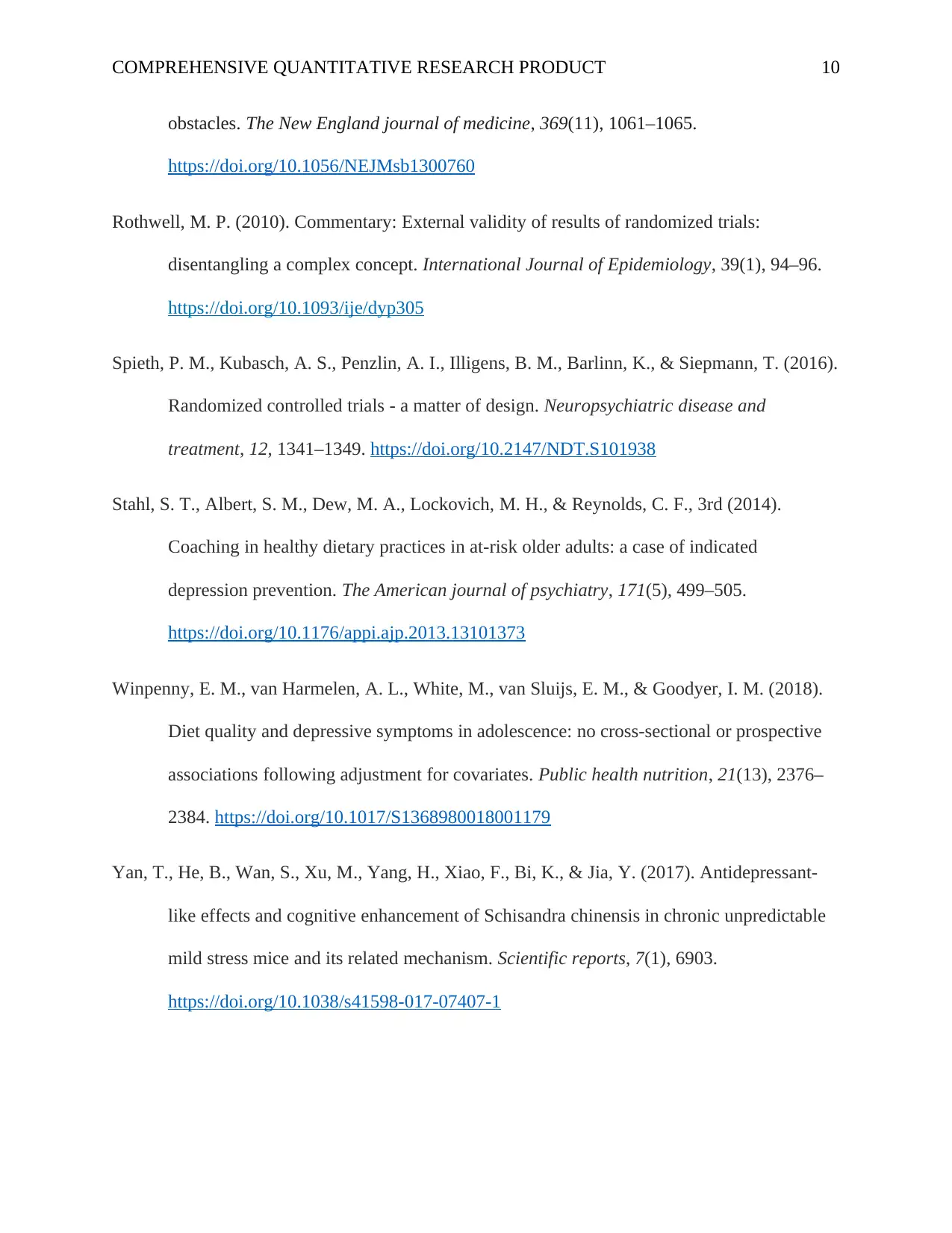
COMPREHENSIVE QUANTITATIVE RESEARCH PRODUCT 10
obstacles. The New England journal of medicine, 369(11), 1061–1065.
https://doi.org/10.1056/NEJMsb1300760
Rothwell, M. P. (2010). Commentary: External validity of results of randomized trials:
disentangling a complex concept. International Journal of Epidemiology, 39(1), 94–96.
https://doi.org/10.1093/ije/dyp305
Spieth, P. M., Kubasch, A. S., Penzlin, A. I., Illigens, B. M., Barlinn, K., & Siepmann, T. (2016).
Randomized controlled trials - a matter of design. Neuropsychiatric disease and
treatment, 12, 1341–1349. https://doi.org/10.2147/NDT.S101938
Stahl, S. T., Albert, S. M., Dew, M. A., Lockovich, M. H., & Reynolds, C. F., 3rd (2014).
Coaching in healthy dietary practices in at-risk older adults: a case of indicated
depression prevention. The American journal of psychiatry, 171(5), 499–505.
https://doi.org/10.1176/appi.ajp.2013.13101373
Winpenny, E. M., van Harmelen, A. L., White, M., van Sluijs, E. M., & Goodyer, I. M. (2018).
Diet quality and depressive symptoms in adolescence: no cross-sectional or prospective
associations following adjustment for covariates. Public health nutrition, 21(13), 2376–
2384. https://doi.org/10.1017/S1368980018001179
Yan, T., He, B., Wan, S., Xu, M., Yang, H., Xiao, F., Bi, K., & Jia, Y. (2017). Antidepressant-
like effects and cognitive enhancement of Schisandra chinensis in chronic unpredictable
mild stress mice and its related mechanism. Scientific reports, 7(1), 6903.
https://doi.org/10.1038/s41598-017-07407-1
obstacles. The New England journal of medicine, 369(11), 1061–1065.
https://doi.org/10.1056/NEJMsb1300760
Rothwell, M. P. (2010). Commentary: External validity of results of randomized trials:
disentangling a complex concept. International Journal of Epidemiology, 39(1), 94–96.
https://doi.org/10.1093/ije/dyp305
Spieth, P. M., Kubasch, A. S., Penzlin, A. I., Illigens, B. M., Barlinn, K., & Siepmann, T. (2016).
Randomized controlled trials - a matter of design. Neuropsychiatric disease and
treatment, 12, 1341–1349. https://doi.org/10.2147/NDT.S101938
Stahl, S. T., Albert, S. M., Dew, M. A., Lockovich, M. H., & Reynolds, C. F., 3rd (2014).
Coaching in healthy dietary practices in at-risk older adults: a case of indicated
depression prevention. The American journal of psychiatry, 171(5), 499–505.
https://doi.org/10.1176/appi.ajp.2013.13101373
Winpenny, E. M., van Harmelen, A. L., White, M., van Sluijs, E. M., & Goodyer, I. M. (2018).
Diet quality and depressive symptoms in adolescence: no cross-sectional or prospective
associations following adjustment for covariates. Public health nutrition, 21(13), 2376–
2384. https://doi.org/10.1017/S1368980018001179
Yan, T., He, B., Wan, S., Xu, M., Yang, H., Xiao, F., Bi, K., & Jia, Y. (2017). Antidepressant-
like effects and cognitive enhancement of Schisandra chinensis in chronic unpredictable
mild stress mice and its related mechanism. Scientific reports, 7(1), 6903.
https://doi.org/10.1038/s41598-017-07407-1
Paraphrase This Document
Need a fresh take? Get an instant paraphrase of this document with our AI Paraphraser
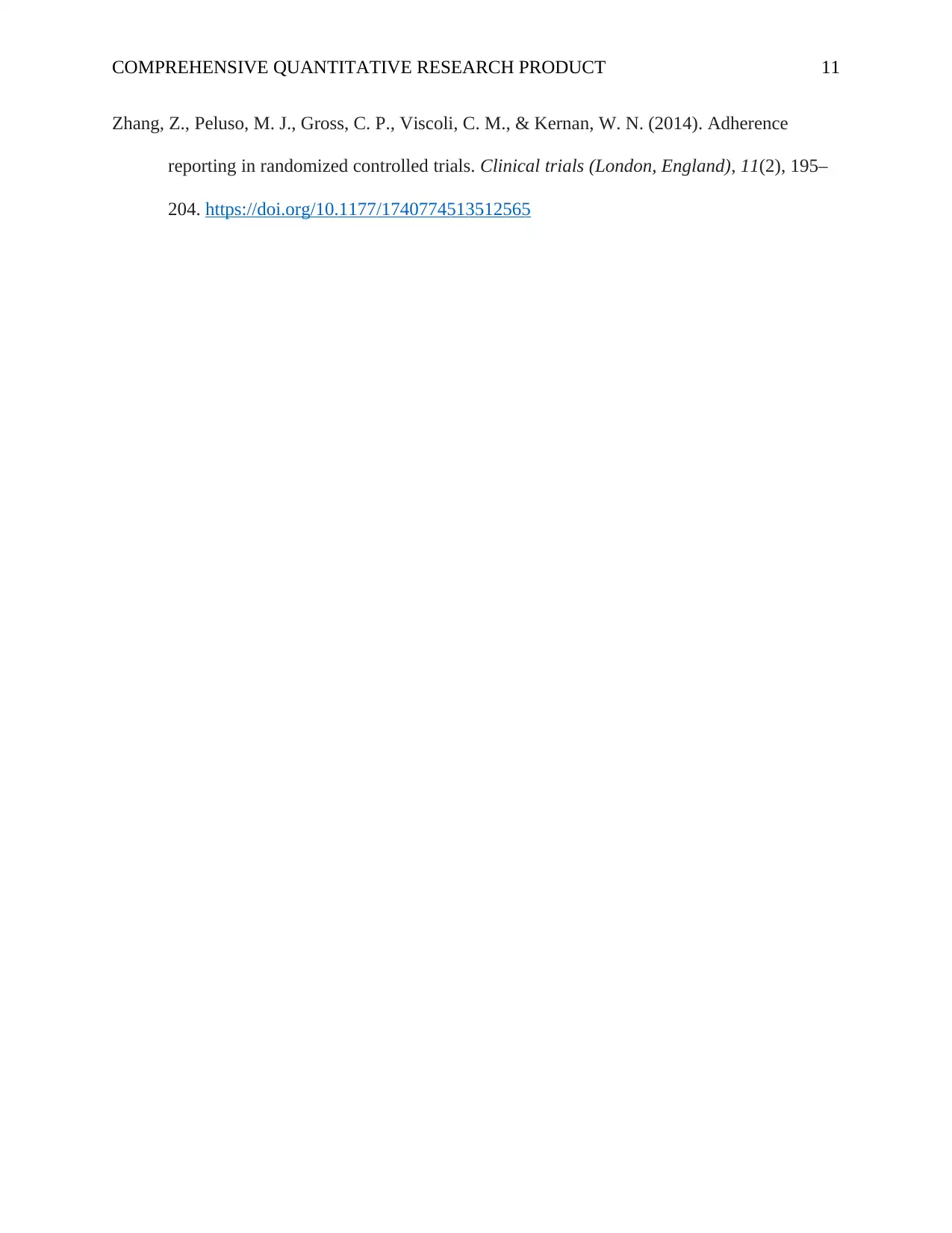
COMPREHENSIVE QUANTITATIVE RESEARCH PRODUCT 11
Zhang, Z., Peluso, M. J., Gross, C. P., Viscoli, C. M., & Kernan, W. N. (2014). Adherence
reporting in randomized controlled trials. Clinical trials (London, England), 11(2), 195–
204. https://doi.org/10.1177/1740774513512565
Zhang, Z., Peluso, M. J., Gross, C. P., Viscoli, C. M., & Kernan, W. N. (2014). Adherence
reporting in randomized controlled trials. Clinical trials (London, England), 11(2), 195–
204. https://doi.org/10.1177/1740774513512565
1 out of 11
Related Documents
Your All-in-One AI-Powered Toolkit for Academic Success.
+13062052269
info@desklib.com
Available 24*7 on WhatsApp / Email
![[object Object]](/_next/static/media/star-bottom.7253800d.svg)
Unlock your academic potential
Copyright © 2020–2026 A2Z Services. All Rights Reserved. Developed and managed by ZUCOL.





